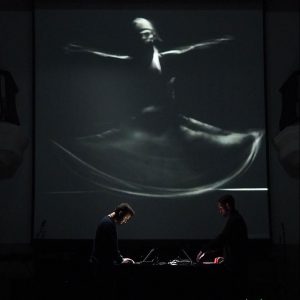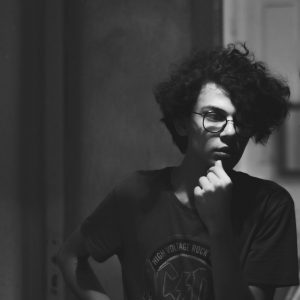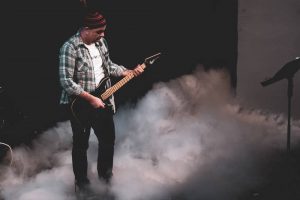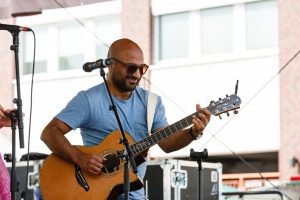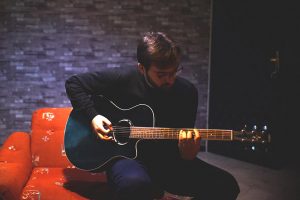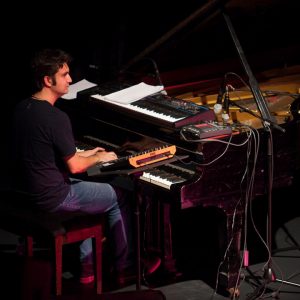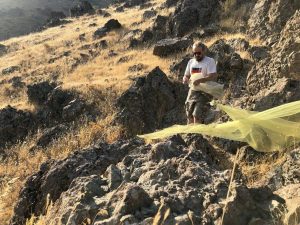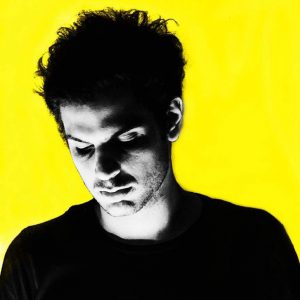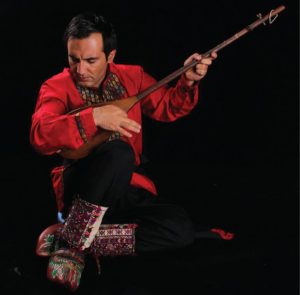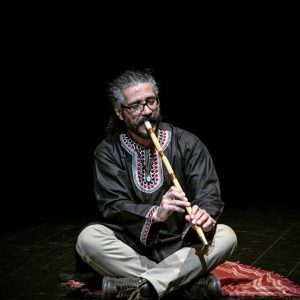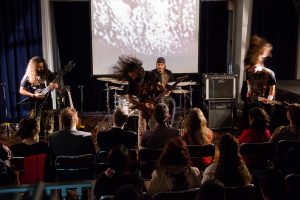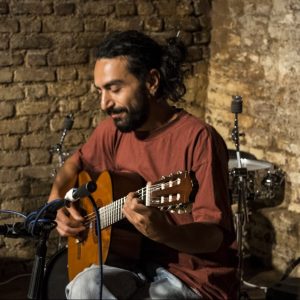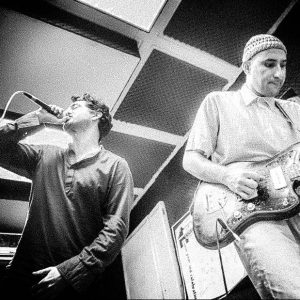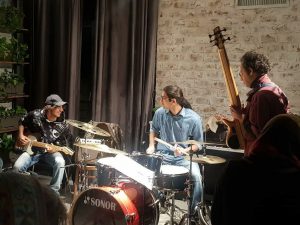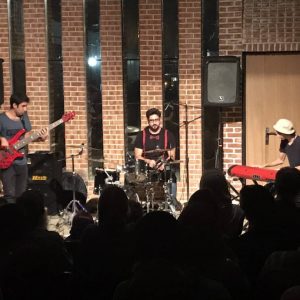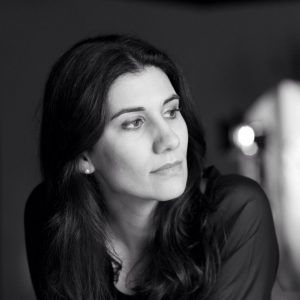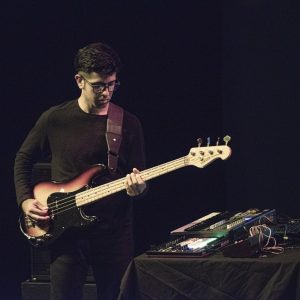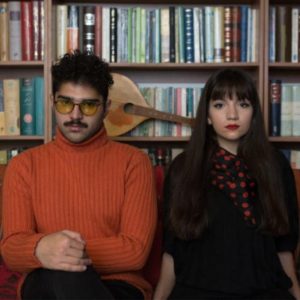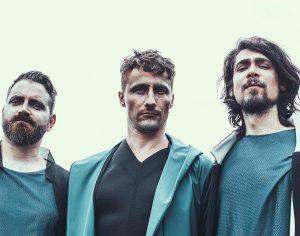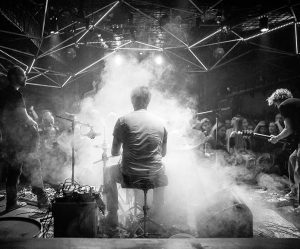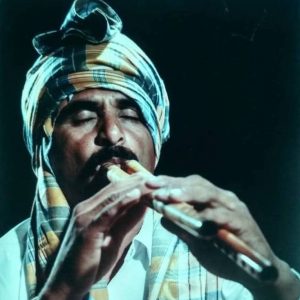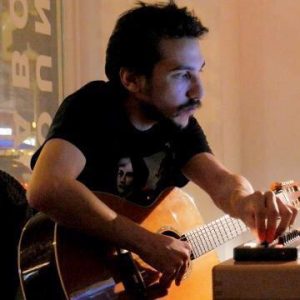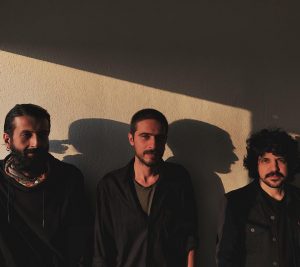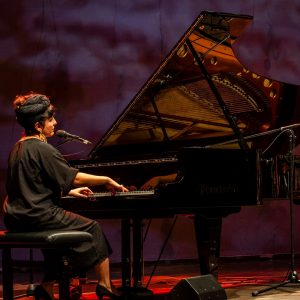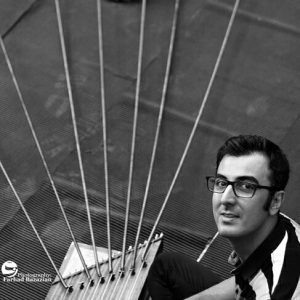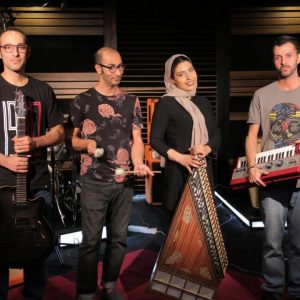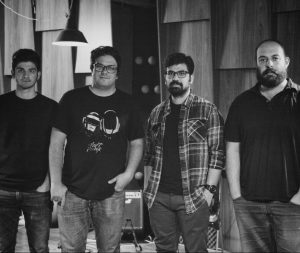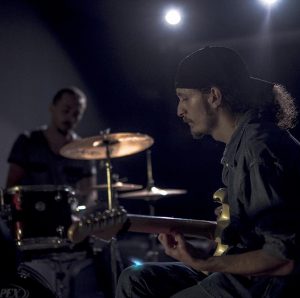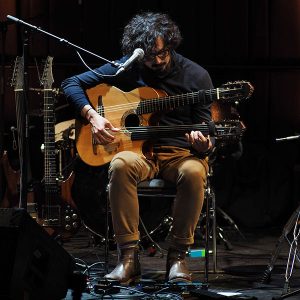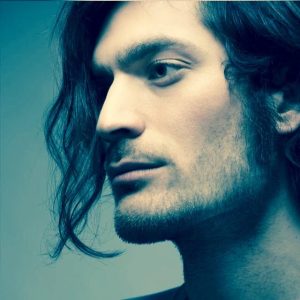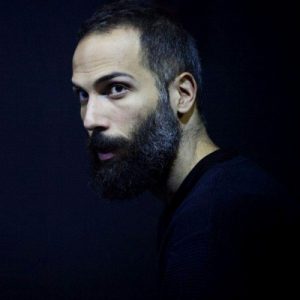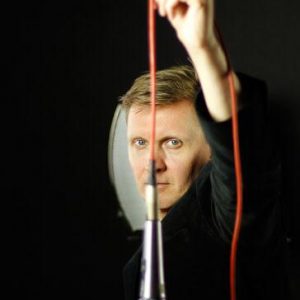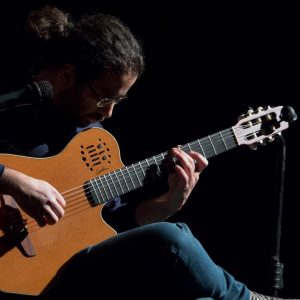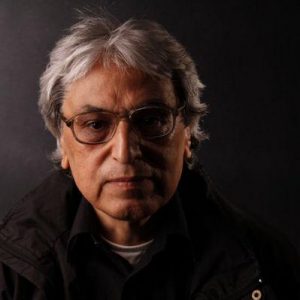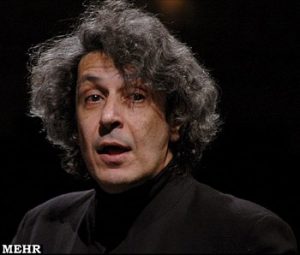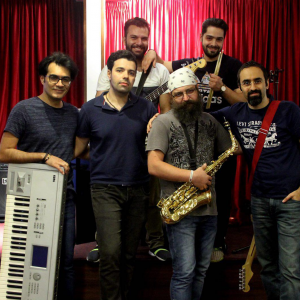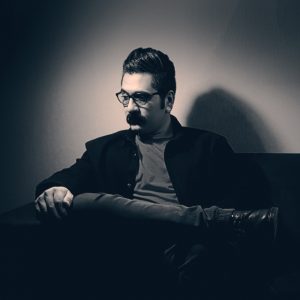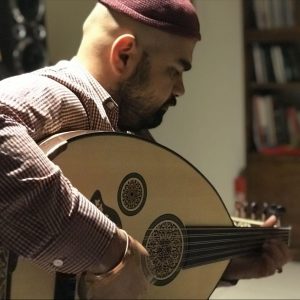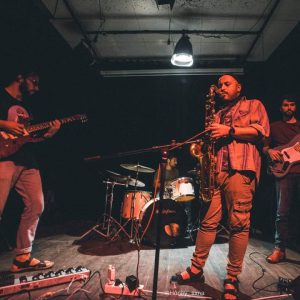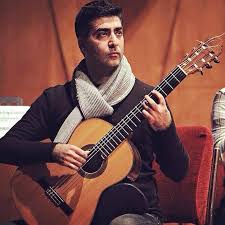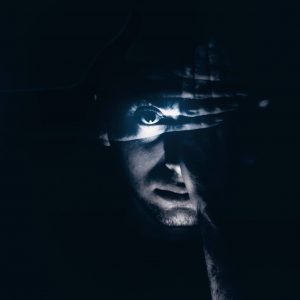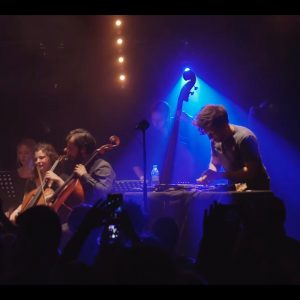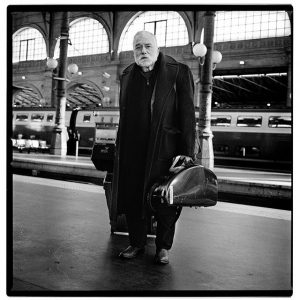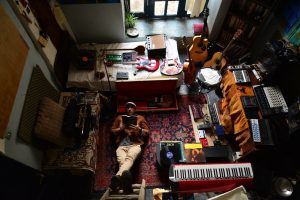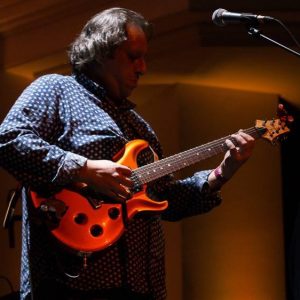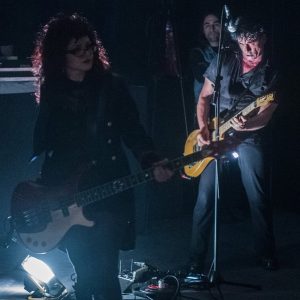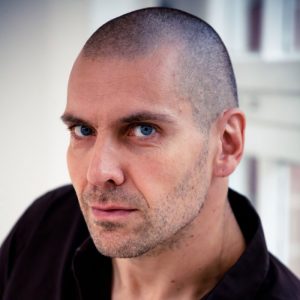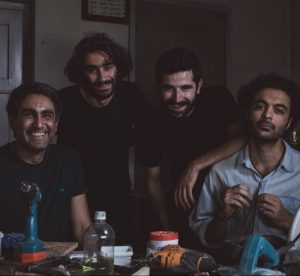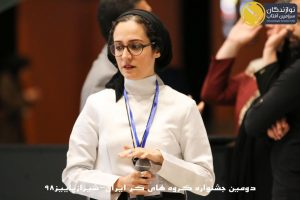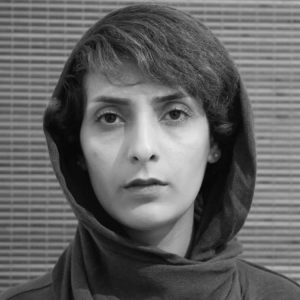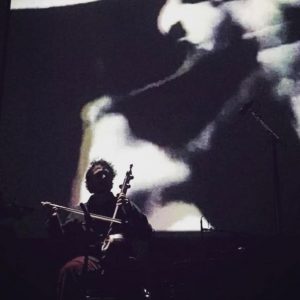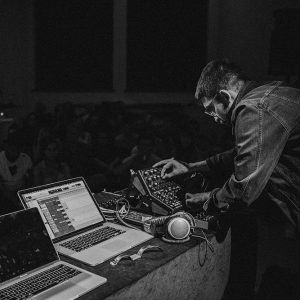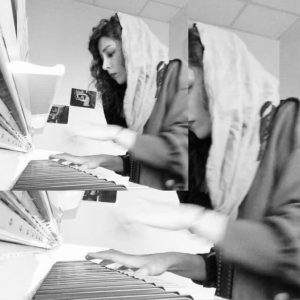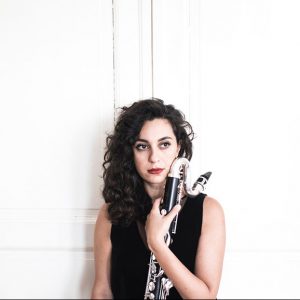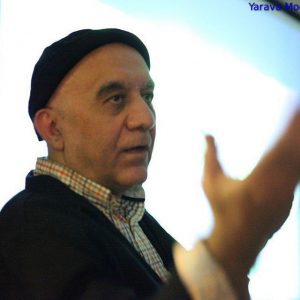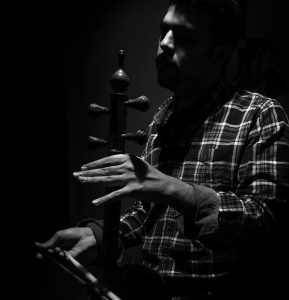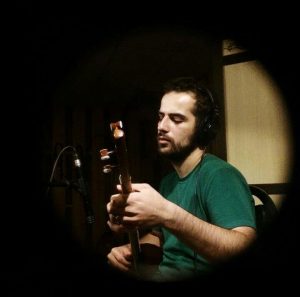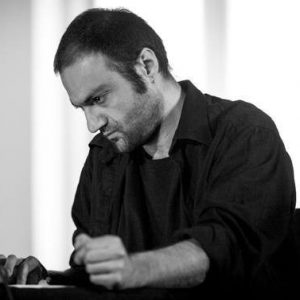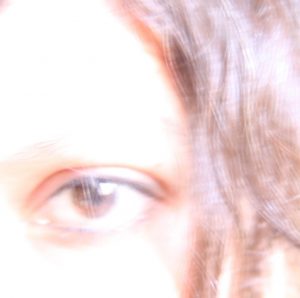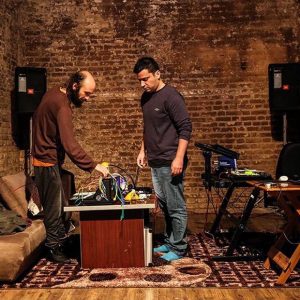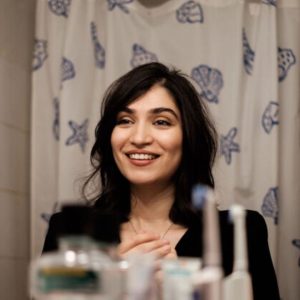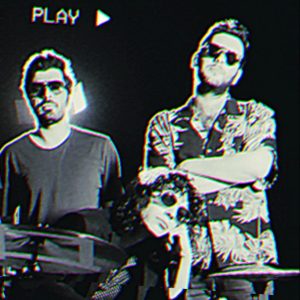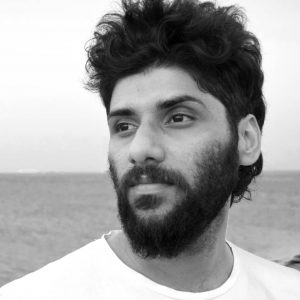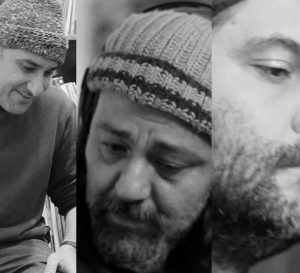| Producer, Iranian Composer, Kamanche Player, Electronic Musician | Tehran, Iran |Ali came from Iranian Traditional music roots with over 15 years of composing and playing Kamanche with an appetite of contemporary electronic music. He was always motivated for these two genres unities to gain new experiments as music. Ali produced many musical experiments and had done many solo performances as well as music bands performs.
| SOME PERFORMANCES |
• Solo Kamanche , at Iranian artists house , August 2011.
• dedicated to Luciano Berio ( an electronic Trio ) , at Italian Embassy , May 2013.
• Iranian Trio – at Arasbaran Hall , September 2014
• Finding Each other ( Piano & Kamanche ) , at Arasbaran Hall , September 2014
• Great Concert ( Shahoo Ensemble ) , at Millad Hall , January 2015
• Alizadeh Works ( Traditional Trio ) , at Arasbaran Hall , December 2015
• Disturbing Dashti , D.O.E.S Festival , at Robero Meson , October 2017
Ali Phi is computer artist and musician from Tehran, Iran.
With a background in environmental engineering sciences & experimental cinematic arts, His experiences in media arts started with the project ‘Elemaun’ in 2008 by audio-visual performances.
The flow of his works is based on programming , generative audio-visual design, interactive media & immersive environment installations which depict the relation between geometry, science, light, poetry and their transformations in computer.
Exploring rituals & roots in Persian art, culture and architecture has affected his creations by taking motifs from old era of Persia, the forgotten essence of Iran & middle-eastern lifestyle to build his futuristic utopia.
He is the founder of ‘nullsight’, a media art collective in Tehran and freelance festival curator of ‘TADAEX’ since 2014.
He has performed and exhibited his works in international festivals like Ars Electronica, Tasmeem Doha, Patchlab & Tadaex beside 20 group exhibitions, 4 solo shows and several media art installations in public spaces.
Alin Joharchi professionally known as Allin is a guitarist singer and songwriter born in Sep 1998 based in Tehran. There are Indie folk single track and an Indie folk Indie rock album, and electronic, Hip Hop and R&B SIngles under his name.
Soundcloud.com/Allinjoharchi
Anna Sharifi, a Danish-Iranian former jazz singer turned Berliner with a bent towards the
electronic club scene met fellow-Dane Nina Branner, an indie rocker by heart, in 2015.
Together they have created a new kind of raw “club-pop”, where industrial beats, playful
organ, synthesizer and powerful vocals merge.
“The band doesn’t chase easy solutions or empty hooks but, on the contrary, content:
Good songs and exiting productions,” wrote the music magazine GAFFA.
The past two years, uon has made appearances on small and big stages in Copenhagen
and Berlin, and have built up a loyal dance audience at their home stage “It’s a BAR” in
Kreuzberg.
Early in 2018 Kirstine Kjeldsen, a musician, sound artist and sound designer, joined uon
to play a line of concerts, the first being Copenhagen Jazz Festival in July 2018. The
band thus performs as a duo or a trio depending on the location and circumstances.
Aran Borouzadeh is known as “Aran” founder of “Graph Platform” is a self-educated musician, singer-songwriter, alternative music artist, sound designer, record producer, experimental musician and filmmaker from Tehran, Iran.
He has done several live shows in Tehran music scene such as “The Gate of Tehran” and “Days of Experimental Sounds” Festivals by House No.4 .
He is currently working on his debut album.
www.qrqn.net
View this post on Instagram
Born in 1990 in Hamedan. He has started playing Piano from 1994, and composing, Sound editing and Sound designing in Films, Series, Teasers, Document Films, Theatre and composing music For “International Festivals” from 2006 to 2016. From 2016 he has started to Compose, writing Songs, Conducting, arranging and playing keyboard and piano in Pop, Jazz, Rock, fusion genres and now working in two Bands “10or trio” as piano and keyboard player and “Madaar” as main member, producer, song writer, composer, arranger, piano and keyboard player .
Born in 1993, I began to teach myself how to paint at the age of 6, trying to copy as many cartoon and film characters from my childhood and tried different fields and styles throughout the years, such as comic, graffiti, caricature, surreal, psychedelic,etc.
Being a musician and drummer myself and knowing many local and international bands/artists, have worked with different artists/bands, including : Sean Lennon, The Black Lips, The Claypool Lennon Delirium, The Muckers, King Raam, The Lemonoise, The Machinez, Pond, Suburbian Rex, Jetpack, Bomrani, Tame Werewolf, Psychic Bloom, The Finches, Khardal and of cousrse House No.4 and more.
One thing that has remained with me is my obsession with pop culture, which fuels my work, and my endless desire to be panoramic and multi-dimensional drives me to new frontiers everyday.
Mixing different cultures, science-fiction, futuristic themes and vintage forms are usually the cornerstone of my works.
Arman began learning western music in youth, but after a while, he discovered his heart about the ethnic music of the Middle East especially the Baluchistan area; as a result, he started travelling to this part of the country and also to other parts of Iran and started learning to play Baluchi sorud, which is an ethnic fiddle hailing from that region, under the guidance of “Pahlavan Ali Baluch”. Also he started playing Rabab and followed the school of “Saravan”. After feeling the connection between Indian music and Baluchistan for further exploration, he began his education in Indian music in Pune, India and completed a bachelor’s degree in Indian classical music. On the other hand he practices “Dhrupad” in “Dagar Bani” one of the most famous schools of singing in India under the guidance of “Milind Nafdey” disciple of “Ustad Zia Mouhiuddin Dagar”. He performs on Harmonium, Rabab, Baluchi Sorud and Tambour. In addition, he is practicing the panjab fiddle known as “Sarinda”.
He participated in the Iranian national youth festival as a musician also he played music in the ethnic music festival of Kerman-Iran, in 2013 he was part of “Ethno Flanders” in Belgium as a musician, two times he participated in the same project in India in 2014 and 2016, he held workshops about Indian music, and ethnic music of Baluchistan. He also collaborated with Randhir Khare, an Indian poet and artist, on the “After Rumi” project, and performed at various private and public events in Iran and India
Ash is a singer, songwriter, and producer. He started recording demos of his music in 2009. He released a couple of singles such as, Use it and Wasted(ft.Meshcut).
In 2017 he founded the alternative/indie trio band, Chikitaz, the band released their debut EP “About colors” on July 2018, the following year chikitaz performed a number of live shows in Tehran.
Ash is currently collaborating with various artists and working on his debut EP.
Ayyoub Saeidi (Maghami Musician)(Iran) born in 1980 , began learning Dotar from Mohammad Yeganeh at the age of six and was fortunate in becoming a student of the infamous Haj Ghorban Soleymani during his teen years.
In 2001 , he joined the Northern Khorasan music group and was able to appear among artists such as Hossein Valinejad, Jafaar Rahmani, Fardin Gholami, Gol nabat and Barat Moghimi, and many more. Currently, he is a Dotar instructor in Mashhad and Tehran and is a representative of musical arts in (anjoman senfi) in the city of ghoochan.
https://music.apple.com/us/artist/ayyoub-saeidi/1484381128
Azarakhsh Farahani. Born in 1981 in tehran has majored in painting at the university . He is the founder and organizer of KouchNeshin music band. Azarakhsh has organized several concerts in and out of Iran with KouchNeshin band and individually. He has also published a musical album, some single tracks and a collection of movie and play music soundtracks. Azarakhsh has held 7 individual caricature exhibitions in iran, the USA , Freance , Belgium and Germany ,and won some awards at international festivals. He acted as the main role in 4 short and long movies and was the candidate of the best actor awards in Fajr Festival and the association of Cinema Autors and Critics if Iran.
Bahram Deyjourian (Ney Player)(Iran) was born on 1972, in Hamedan, Iran. He started playing Ney (Persian end-blown flute) under the supervision of Maestro Masoud Freidooni, 1988. Then, Collaboration continuance with Milad music band with supervision and composition of Maestro Masoud Freidooni as a Ney player since 1990. Afterwards, he became Ney soloist of Hamedan radio and television since 1991.
In addition, he started to learn playing Piano and theory of music under the supervision of Dr. Amir Shayanian, 1993.
Subsequently, he synchronized in various music bands in different styles and cooperation with theater groups as a music player and composer.
All of these experiences led him to start busking and continuous journeys and holding instructional workshops and numerous individual and collective performances and concerts in Iran, Armenia, Afghanistan, Georgia, Turkey, and Tunisia, and field research about world music since 2010.
Alongside traditional performing of Persian music in recent years, Bahram Deyjourian has been always looking for experiencing companionship between traditional modal and folk music with other nations music and also western music; experiments like compilations fusion music and electronic experimental, jazz and folk.
In addition to playing the Ney and singing, he is also familiar with playing other instruments such as wind instruments including, Bamboo saxophone, Clarinet, local Flutes. Also, some other instruments such as Setar, Tanbur and Jew’s harp.
Born in 1994
Instruments: Seroz, Tambourine, Harmony
I started playing music in 2011 with Harmony and then in 2017 I chose Serouz as a main instrument. I have learnt Baluchi music with the Sarvoz instrument from professors such as Khodadad Shape Zehi, Rasoul Bakhsh Zangshahi, Ghafoor Zangshahi, Hibat Morad Damani, Ali Mohammad Baluch, Ahmad Watankhah, Faqir Mohammad Shape Zehi. Before Serouz, I learnt to play the tambourine to strengthen the rhythm spontaneously without a teacher, and now I work in playing these instruments.
We have now set up a small music school in Tehran with the help of Sogol Khojasteh. And Balouchi music is taught there. There are so many activities there from improvisation and producing thermal music (adapted from Guati) to collaboration with other ethnic groups in order to find cultural, historical and instrumental commonalities.
Apart from working in the field of music, I have also done some research on Baluchi music. And, I collaborated with Mrs Sogol Khojasteh for her master’s research project on Baluchi music, and the result of this collaboration is her master’s thesis, which is currently available in the library center of the University of Arts.
-Performed in 1396 to celebrate the elites of the province in Ferdowsi Hall of Zahedan
-Performed in 1397 in Milad Tower of Tehran in Sistan and Baluchestan Cultural Week
-Performed in 2015 at Tehran University of Arts
-Performed in 1394 Tehran International Handicrafts Exhibition
-Performed in 2016 in honor of three prominent poets of Balochestan
-Performed in 1398 in Chabahar Free Zone Hall for Nowruz
-Performed in 1400 in Tehran Eco Organization
And Several performances in 1400 Embassy of India and Pakistan
-Performed in 1399 in Turkey
In addition, before all these activities, I started entering the field of art with theater, and I also performed activities in this field, the names of each of which do not fit in this space, so I will suffice with the musical activities here.
Bang(بانگ)(meaning “the call” in Persian) is an Iranian music band and the official music band of Komak Charity Foundation. Bang was first formed in 2018 and in their first year of formation they mainly concentrated on covering classic pop/rock songs in an alternative way, which shed a light on their capabilities and gave them a way to come up with their original songs.
By the end of 2019 they started their public performances. After successfully performing for the first time, the pandemic soon prevented the rest of their plans.
Bang currently has 8 members and they are working hard on their first album of which they have arranged 6 songs so far, and they are looking for sponsors. The most significant factor of their songs is the harmonized back vocals and choir.
Pooria Rahimian – 12string acoustic guitar/vocal/back vocals
Farshid Naghilou – classical guitar/vocal/back vocal
Mehrdad BeigMohammadi – bass
Bozorgmehr Ghajar – drums/cajun/back vocals
Ali Fekri – acoustic and electric guitar/ vocal/back vocals
Shima MohammadBeigi – back vocals
Pooyan Zadmajid – violin
Hamid Pakdel – electric guitar/ vocal/ back vocals
Baramant as a multi-media art group was formed in 2006. At first, they were just a heavy metal music band, but after a while they decided to proceed the work with other aspects of art such as video art, performance, and etc. Baramant has performed and participated in several domestic and international exhibitions, festivals, and galleries. In 2019, they were able to release the first music album named “Homarg” on all music-streaming platforms. Hamed Babaei, based in Iran, Amir Khoshharf based in the USA, Hassan Sheidaei based in Germany, and Amir Pourmand based in Iran are current members of the band.
Behrang Shahinpar, Born in 1986 in a Turk family in Tehran. He is a self-educated musician with a sense for listening to and living with music. For him, playing music to get the feeling of meaningfulness is one phase of his spirit and living in the society with music is the other phase.
He also works as a visual artist living with images and forms.
Bon-Baz (Rooz.Alireza.Peter) in Farsi means the opposite of the phrase “dead-end” in English. The ethos of this group cannot be described in a better way. Musically and culturally they are borderless, a mixture of rap, punk, and traditional melodies, they are not constrained by a single genre. They’re a blend of cultures from Iran and the Americas. Borderless, identityless, Bon-Baz shows us that all ways are open
Charseh (Jazz trio)(Iran) is an Iranian Jazz trio, formed in 2017 by Nima Najafi, Aria Mousavi and Aidin Sadeghzadeh. The first live performance of the band was at Sorna Jazz jam sessionas as the openning band in 2017. The band also played some jazz music in House No. 4`s Summer Jazz Festival. Moreover, Charseh Jazz Trio had couple of public performances in places such as the Embassy of the United Kingdom or the Australian Embassy in Tehran. The band is now working on its first studio album to be released in the following months. https://www.picuki.com/profile/charsehjazzensemble
Cymin Samawatie is one of the most creative singers and composers based in Berlin, who has initiated celebrated ensembles of contemporary music.
She studied classical music in Hannover, focusing on percussion and piano, as well as jazz voice and composition in Berlin.
Her compositions combine various styles of music including chamber jazz, open improvisations, modern compositions, impressionism and minimalism. Her quartet Cyminology, founded in 2002 combines Persian poetry and chamber- esque contemporary music presenting poets such as Rumi, Hafiz, Khayyam and Forough Farrokhzaad.
Cymin Samawatie’s performance with Bobby McFerrin in 2003 was one of the highlights in her career. In 2008 she started collaborating with producer Manfred Eicher, founder of the ECM record label, where her last three albums have been released. In 2013 Cymin Samawatie founded the unique “Trickster Orchestra“ together with Ketan Bhatti.
Cymin Samawatie is a multifaceted artistic personality who creates new and daring elements adding to the bridges between Western and Middle Eastern music.
Since 2018 she is a scholarship holder of the Tarabya Cultural Academy in Istanbul.
www.CyminSamawatie.de
www.Cyminology.de
Dadgar Mohajer Taleghani (Dadgar) was born on April 4th, 1983 in a family of musicians in Tehran. He was motivated by his father, Kaveh, a former singer and electric guitar player of a local rock band in Aachen, Germany in the 70s’. Dadgar, electric guitar player, singer and songwriter, started to work with early DAWs in 1999, recording his first tunes. Dadgar and his highschool friends formed a rock band, where he met Mita Maleki. Dadgar and Mita Maleki, the classmate of Yasser Bakhtiari (YAS), started their professional career together producing YAS’s first Hip-Hop songs in 2004, and later they collaborated in the production process of several Persian pop and hip-hop musical tracks. Dadgar, was also interested in electronic music, and techno became his favorite genre after rock. Dadgar is also the founder, the lead singer and the lead guitarist of the Glam Metal band “illuminiac”.
DEEV, “the better half” of Arman Paxad, the synth-obsessed, bass and beat aficionado of the band King Raam, is his overshadowing alter ego; The nonconforming explorer who creates for the sake of creation.
Having developed a distinct taste through a decade of writing and performing and over two decades of avid music listening, DEEV brings a finely sculpted blend of words and sounds to his sets, be it a DJ mix, an electro-ambient performance, or an outright vigorous sonic manifestation of his feelings and experiences through fabulism and dark electronica.
DEEV released his first single, REGENERATE this year; a three-track ambient illustration of how he views space, and is currently working on his first EP, MORON.
Duos Duet is a musical duo, formed by the cellist Golsana Shenasaei and the violinist Niki Yaghmaee, in 2016, Tehran.
They started performing as street musicians and following that, they performed in various gigs and events in Iran, Europe, Turkey and Georgia since 2017 onwards. Pieces from streets is the debut release by the musical duo, Duos Duet containing five tracks which originally conceived from improvisations, during street performance sessions of artists Niki Yaghmaee -violin- and Golsana Shenasaei -violoncelle- in 2017.
Edi Nulz consists of three jazz musicians that unmistakably bring along a heavy dose of rock music. The music of Julian Adam Pajzs, Valentin Schuster and Siegmar Brecher is far from any classical jazz structures. Besides the strong instrumental skills and the highly complex songs of the musicians, it is above all the driving energy in the playing style, melodies, harmonies and riffs that sets the music of this trio apart from traditional jazz, and is rather reminiscent of the prog-rock era in the 70s. In spring 2018 Edi Nulz released their latest album ““El Perro Grande” (Boomslang Records)“.
They are ready to take the next steps to conquer the international stages. In April 2019 the trio will be part of the showcase porgramme at jazzahead! in Bremen. Let´s see how their career evolves!
Siegmar Brecher – bass clarinet
Julian Adam Pajzs – guitar
Valentin Schuster – drums
ELEKTRO GUZZI have been called many names: man-machine, clockwork, techno organism.
A trio of guitar, bass and drums, Elektro Guzzi overcome the boundary between analogue versus digital, performing techno live with the drive of a machine and the sonic detail of an instrument – without any computers or loopers.
The unparalleled appeal of their unique, energetic live performance – you see how every sound is created, right there, on the spot – has made them a primary choice for cutting edge dance music festivals like Roskilde, Sónar (2x official program), Mutek, Melt!, Stop Making Sense, C/O Pop, Eurosonic, Extrema, Iceland Airwaves, Sziget, Dancity and many more across Europe, North and Latin America and Japan. In addition to that, their journey has taken Elektro Guzzi to most of Europe’s clubs, including performances at Fabric and every single floor at Berghain.
A collaborative EP with KiNK here, an audio-visual live show there, a Resident Advisor podcast or an album with a full trombone ensemble in between – Elektro Guzzi are always on the move.
Selected discography Elektro Guzzi
Elektro Guzzi – Hexenschuss/Elastic Bulb (Macro M16) Single
Elektro Guzzi – Elektro Guzzi (Macro M18) Album
Elektro Guzzi – Extrakt EP (Macro M21) EP
Elektro Guzzi – Live P.A. (Macro M23) Album
Elektro Guzzi – Parquet (Macro M27) Album
Elektro Guzzi – Allegro EP (Pom29) EP
Elektro Guzzi – Cashmere EP (Macro M32) EP
Elektro Guzzi – Circling Above (The Tapeworm – TTW#56) Cassette
Elektro Guzzi – Observatory (Macro M399 Album
ELEKTRO GUZZI have been called many names: man-machine, clockwork, techno organism.
A trio of guitar, bass and drums, Elektro Guzzi overcome the boundary between analogue versus digital, performing techno live with the drive of a machine and the sonic detail of an instrument – without any computers or loopers.
The unparalleled appeal of their unique, energetic live performance – you see how every sound is created, right there, on the spot – has made them a primary choice for cutting edge dance music festivals like Roskilde, Sónar (2x official program), Mutek, Melt!, Stop Making Sense, C/O Pop, Eurosonic, Extrema, Iceland Airwaves, Sziget, Dancity and many more across Europe, North and Latin America and Japan. In addition to that, their journey has taken Elektro Guzzi to most of Europe’s clubs, including performances at Fabric and every single floor at Berghain.
A collaborative EP with KiNK here, an audio-visual live show there, a Resident Advisor podcast or an album with a full trombone ensemble in between – Elektro Guzzi are always on the move.
Selected discography Elektro Guzzi
Elektro Guzzi – Hexenschuss/Elastic Bulb (Macro M16) Single
Elektro Guzzi – Elektro Guzzi (Macro M18) Album
Elektro Guzzi – Extrakt EP (Macro M21) EP
Elektro Guzzi – Live P.A. (Macro M23) Album
Elektro Guzzi – Parquet (Macro M27) Album
Elektro Guzzi – Allegro EP (Pom29) EP
Elektro Guzzi – Cashmere EP (Macro M32) EP
Elektro Guzzi – Circling Above (The Tapeworm – TTW#56) Cassette
Elektro Guzzi – Observatory (Macro M399 Album
First, I want to focus on my dad who was a professional pioneer awarded “Doneli” and “tanbourak” player and master from his early teenage. He was the leader of a band with different genres of vocalist, and many other musicians wanted to play with him as a band not any other “Doneli” player. In addition, after my father’ death in an accident in 2011, I’ve been their only preference because they believe in my inherent strengths in playing this instrument. “Zobaideh Azadi” is the only woman in his band who has been working with him for more than 20 years. Now, she still prefers to work with me “Easa”.
My dad taught me how to play this instrument carefully and made a lot of endeavors to learn. He insisted on keeping the right way of playing it alive. Further, I turned to be his messenger. I’ve got the first place in all of the five Festivals I’ve participated in.
Farshad (aka tarxun) was born in 1992 in Tehran, Iran. He is an Architecture graduate with Sound Studies as his post-grad. His sonic works cover a spectrum of electronic/acoustic music, sound and new media. He is also very passionate about drawing, collage, visual arts and photography.
Gavan project aims at a different approach to Electro-acoustic music by incorporating classical and ethnic music of Iran together with electronic music elements. It should be noted that in terms of performance, with the help of ambient music, an improvisational approach is adopted in order to make way for the form to evolve in and of itself as well as phrasing to be able to simultaneously create musical forms and phrases in time.
In Persian “Golnar” means the flower of Pomegranate. Here, it represents a journey or rather the emotional imprints of a woman who sees her music as the reflection of her changing identity and the coming together of many different worlds, just like the pomegranate grains all together in one body. Golnar Shahyar is a Viennese based vocalist/composer/performer/lyricist, who has already made a name for herself as the lead singer of her bands Sormeh, Choub, Gabbeh and Golnar & Mahan. She has been performing internationally for years in many renowned venues and festivals and has done many collaborations in the field of dance and theatre. “The hypnotic polyphonic weave of Golnar Shahyar’s voice, her guitar or piano, takes place so naturally as a floating story about the diversity of life, crossing her fondling fingers over your mind and heart.” (Danas Newspaper). Golnar’s musical signature is her ability to connect different music styles and cultures in such an organic way, that makes the complexity of her compositions and singing almost effortless. Her voice is powerful yet very subtle and covers a whole range of emotions. In her performances, she creates an atmosphere where authenticity, vulnerability and empathy are celebrated as strength. “I don t play to please” she says, “I play to be Honest”. She sings in many languages; Farsi, English, Turkish, Arabic, Kurdish, Sephardic etc., and sometimes compromises actual language for her fantasy language to be more authentic. Being a true improvisor, she constantly breaks out of her comfort zone in her performances and seeks to make new musical dialogue. The core of her work is communication, personal expression and storytelling. In her solo act, GolNar, she accompanies herself on the guitar and writes and sings about human essence, emotions and social struggles. Her lyrics are simple yet deliberate and direct. They pass through personal experience, culture and gender identities and speak to the audience in an empathetic and unifying way.
Golnar ist eine Jahrtausendstimme. Die einzige Stimme, die mich, wenn ich sie live erlebe, je zu Tränen gerührt hat. In jedem einzelnen Ton, den sie singt, steckt eine unfassbare Magie.” – Mira Lu Kovacs
http://www.golnarshahyar.com
Hamed Habibpour: Born on June 1365 in Tehran. He began learning Santour from his father at age 6. In adolescence, he simultaneously learned to use the tombak to Bahman Rajabi.In 2004, he entered the University of Art in the field of Iranian music and graduated from the university. He continued his studies at the Faculty of Arts at the University of Tehran. During his studies, he learned from the teachings of such scholars as Sharif Lotfi, Majid Kiani, Dariush Talaei, Dariush Pirniakan, Reza Parvizzadeh and Amir Eslami. Composing for theater, short films, animation and the creation of several innovative instruments are among other activities of the artist. He has been collaborating with various music groups and artists including Mohammad Motamedi, Vahid Taj and Milad Derakhshani in her work. Habibpour has been teaching Santour, Tonbak and Daf since 2005.
Hossein RangChi (born 1984 – Dezful,Khozestan,Iran) started at 8 music with Ney instrument ; thus firstly listened to musical note by Ney . For some years he practiced the Radifs of Persian traditional music , and learned Ney Traditionally and experimentally. After some years, He started to learn Setar experimentally. “I was always, mostly influenced by regional and Maqami music.” However , He just played traditional and folk music about 15 years ; with Ney ,Setar, and further, Violin . As internet developed ,He find a way to world music. From Electronic music of 80s ,to Folk/Rock ,Blues and Jazz and etc. Influenced by Bob Dylan ,He started do play Acoustic guitar and Harmonica, of course with a background of Persian traditional and Folk music. in these years , he had experiences in Electronic music. In this field ,He is mostly influenced by John cage, Edgard vare’se and Peter christopherson. In the sometime ,He both doing Electronic and experimental music, and playing Folk/Rock music with his regional accent.
https://soundcloud.com/hosseinrangchi
Humsa is a jazz fusion band founded in 2010 in Iran. We have locally performed on stellar scenes in Iran and we have some plans to perform on international scenes.
Our band has gone from a pure jazz to a more middle eastern jazz fusion sounding band.Our aim has been to introduce jazz and middle eastern music to a wider variety of audience. Moreover,we have shown where East and west can perfectly meet in harmony through music
Khashayar Heidari: Piano/synthesizer
Ali Gerami: Drums
Mojgan Hosseyni: Qanun
Pouya Assadian: Guitar
Jerpack is an indie/alternative music band co-founded by Mohammad Shariat and Majid Heidari in 2017. Initially, Jetpack was set out to be a Due band, this changed after a while when Arian Shariat joined the band as the lead singer. With Arian in the band, Jetpack released several songs in English having Arian as the singer and songwriter, Mohammad as the producer and Majid as the guitarist. Later Erfan Asemi Nezhad joined the band as the drums and electric percussion player for their live shows. Since its beginning, Jetpack has had two live shows, at the Tehran Electronic Music Festival and Ruberu Mansion, and has focused more on making and producing music.
Kasra Saboktakin is one of Iran’s prominent musicians who has recorded and toured with a wide array of Iranian and international artists. He is the co-founder of “Barad”, who adeptly merged the essence of Iranian Folk with Rock music. Among his career highlights are collaborations with Anoushirvan Rohani, Mohsen Namjoo, Sara Naini, Milad Derakhshani, O-Hum, Dang Show, Pallet, 127, Shahrzad Sepanlou, Kaveh Yaghmaee, and many others.
Aside from performing on stage with other musicians, he is a composer writing scores for documentary movies.
Moreover, Kasra is recognized as a mentor for his years of educational contribution to Iranian younger bass players . He has more than 15 years of academic and private teaching experience. Many of his former students have achieved success among the Iranian, and international community.
Mahan Mirarab is an Iranian guitarist/composer based in Vienna, Austria. He has spent years learning about Persian music and the indigenous sound and cultures of the country such as Arabic, African, Turkish and Kurdish music, while refining his skills in Jazz music. Notabely using fretless guitar, he specializes in blending the oriental microtonal system with jazz. After moving to Europe in 2009, he has become an acclaimed musician in european music scene. He has participated in various projects in world and jazz music as a performer, as well as a composer/arranger for multiple film theater, and music bands. He has since produced four albums; Persian Side of Jazz, Choub, Sehrang, and the most recent one Derakht, from his trio Golnar & Mahan.
http://www.mahanmirarab.com
Mahan mohammadi
Trumpet player
Classical and improvising musician,
Studying music at Tehran University of finearts
He have had concerts with aiso orchestra at vahdat hall
And other bands such as humsa, mahan mirarab trio, vineh, berenj, zeema
And recently with peter pirhosseinloo standard jazz band.
Mahan Tabrizinia born in 1987 in Tehran, He is an Iranian artist based in Vienna, where he is currently studying Jazz Music.
He is a guitarist and an experimental-minimalist composer. He enjoys producing electronic, ambient, post-rock, down tempo, and experimental jazz.
He collaborated with many artists and Bands in the Tehran music and art scene.
In his upcoming performance, he will play some abstract music from his solo project, as well as his new project (City Life) The concept of City Life project takes inspiration from his nostalgic feelings and everyday moments.
Makan Ashgvari is an Iranian musician living and working in Tehran. His last album “To Trucks”, was published on March 2018 and performed in Tehran, Shiraz, Berlin, Hamburg, Paris and Milan. His performances at Acud Macht Neu Berlin, and Kampnagel Hamburg and Tadaex festival in Tehran was praised and appreciated.
“To Trucks” contains a great variety of materials. From his field recordings while traveling in Iran, to unique rythms and electronic sounds. He sings along his own version of classical Iranian poems and old songs.
Born in Iran in 1980, in Italy since 1993. He composes, writes and sings his original songs in Persian but also those translated and adapted from Italian and French authors. For some years he has directed the Anam Band Project, with which he performed live in Tehran and Rasht in 2018-2019 on various occasions. He has so far made an album, independently, entitled Volume 1, and another one coming soon in 2020 in collaboration with the Anam Band Project.
https://www.youtube.com/user/ManiNaimi
Markus Wach is a multi-instrumentalist, based in Germany. The focus of his musical work is on the folkloristic and improvisational traditions of the Middle East and Central Asia. He plays a set of rare traditional musical instruments from all over the world with a great emphasis on string instruments, bowed and plucked. One of his main goals is to keep dying traditions of different musical cultures alive and use them to create a unique musical language for his compositions and improvisations.
Maryam hemmati is an Iranian vocalist,song writer, guitarist and architect. Born in 1992, she initiated her musical education by taking classical guitar lessons when she was 16, and this evolved into a solo career that continues until today. For her, music and singing have no cultural or geographical boundaries, and her musical language in fact, does not fit into any single genre.
Maziyar Khavajiyan AKA Amoo Mazz (Born on Agust 21, 1986) is an Iranian bass player, singer-songwriter, sound designer & music producer.
He did start his career on 2005 as a photographer & session musician in Pop music scene & he was former member of alternative rock bands Majid Kazemi & Comment Band.
He released his first E.P named “Fana” (Annihilation) based on mystical concepts of the “Sufism” in 2012.
In 2015, he created #Tehran Band, the electronic-urban duet project in collaborating with the sound engineer & record producer Mrz.Asghari (WoolWave) which they have released two studio albums.
After leaving Iran on 2009 Maziyar attended Cultural Center of University Malaya in Kuala Lumpur, MY & he performed in several music festivals as a fusion jazz artist between 2010 to 2014 such as Triomyn performance in KL International Jazz Festival 2013.
In addition to his music career, Maziyar brought up a new art direction line with the folk/soul singer-songwriter Jalil Shoaa & also he appeared in Soheil Nafisi ‘s last debut LP “New Design”.
Mehdi Behbudi (Sound Artist) (b. 1982) is a sound artist and performer based in Tehran. He started to work and experiment with computer music since 1999 and from 2007 put more concentration on live performances in different spaces; indoors or outdoors. He studied composition in Tehran conservatory of music and is self educated in mathematics, physics, and electronics. He not only made performances and installations but also worked on realization and performance of pieces by Alvin Lucier, James Tenney, John Cage, Nader Mashayekhi, Peter Ablinger, and Georg Nussbaumer. In last ten years he has participated in more than 100 sonic projects in different cities of Iran and also in Germany, Austria, Italy, Greece, and United States. In 2012 he founded Radical Tehran events and worked as an artistic director in different events like Sound-Tehran-Music.
I his works he’s not only working on sound as an auditory phenomenon with different physical aspects but also works on social and moral aspects of sound as material for artistic creation.
http://behbudi.weebly.com/
Michael Schiefel is a jazz and experimental singer. He studied in Berlin University of the Arts and graduated in 1996 with a High Honours Diplom in vocal jazz and music education. He is currently a professor of jazz vocal in the Franz Liszt Conservatory of Music in Weimar, a position he has held since 2001.
Born in December 31th, 1982 in Konarak, Sistan and Baluchestan Province. He was born in an art-loving family. He was exposed to East music (India and Pakistan) and original and classical Baluch music from his childhood. As well as that some well-known masters such as Kamal Khan Hot, Yadu Sarozi, Pahlavan Ali Baluch, Ali Mohammad Brahui and many other masters came to their home for recoding their works in his father’s help.
His family made the first recordings and reproductions of Balochistan music in the years before the Islamic Revolution in that region of Balochistan. And all productions were sent to Fars Gulf, Tehran, Pakistan and India, Africa, etc.
From the fifth grade of elementary school, with great talent in any field, he began to learn music directly with the tabla instrument. His second instrument was the harmonium (Baja = key wind instrument similar to the accordion) and his third was the Balochistan banjo. And, with about a year of playing and experience of banjo, together with the great master of Balochistan, master Gholam Rasool Dinarzehi, he started to perform in formal and informal ceremonies in his 11.
After years of practice and performances in formal and informal ceremonies, he won the second place of Balochistan Benjoo in the first music festival in the southeast of the country and won many first and second places in rhythm and Benjoo in various festivals.
Now, he has gained a wealth of experience in recognizing the intersection of Eastern music (especially Indian, Pakistani and Baluchistan music).
Currently, he is working in music with his artist and art-loving friends in the capital of the country (Tehran). Collaboration with Bamsar, Ariana, Avae Shadi and several other groups can be mentioned.
Online and offline training of banjo, dahak, tabla, harmonium instruments is also one of his current activities.
The guitar player and composer, Mohammad Azmand, was born in 1987 in Tehran. He started Rock music learning when he was twelve years old. Some years later, thanks to Pouya Mahmoudi, he got familiar with Iranian regions music and did his best to comprehend and learn it. Meanwhile, through studying painting in an art school, he had the opportunity to gain a better perception of art. After graduation from the art school, he began learning Jazz music and in 2008, he won the first prize in the First National Jazz music competition which was held in Iranian Artists’ House. He has performed a number of concerts with several bands in and out of Iran and recently with his own Quartet he has been trying to find the common features of Iranian and Jazz music in order to bridge the gap between these two and come up with a unique tune.
https://www.youtube.com/channel/UCF0cL-OFh4aQZmLHXJQM9xw
Mohammad Reza Izadi Born in Tehran, founder and manager of Fado Music School , musician and setar and tanbur instructor, graduated from the Faculty of Music , Tehran University of Arts _ graduated Master of Cultural Affairs Management – Islamic Azad University of Tehran – on the topic of thesis Identification and Ranking of The Factors Affecting the Employment of Music Graduates .
He’s studied, trained and learnt from :
art Master Sharif Lotfi and Amir Hossein Eslami in the field of basics and composition , The great master of tanbur and maqami music of Kermanshah Taher Yarvisi _ Seyed Afshin Qureshi _ Seyed Arash Shahriari in the field of tanbur playing and Hossein Mehrani _ Bahram Jamali _ Ehsan Emami in the field of setar and the basics of Iranian music.
Teaching experiences In first class schools in Tehran and Karaj, including Mirza Abdullah School under the management of master Mohammad Reza Lotfi from 1382 to 1384 , Arasbaran Music School under the management of Shahram Saremi from 89/1/1 to 95/1/9 , Erfan Music Center _managed by Mohammad Taybi Jalili _ from 1381to 1384 , Delshodegan Music School _ Managed by Hadi Sepehri _ From 1389 to 1394 , Chakad Music School under the management of Hossein Ghasempour from 94/1/3 to 96/2/2.
Other artistic and cultural activities: Artistic Secretary of Sorayesh Magazine of Tehran University of Arts Secretary of the Faculty of Music at the National Movement Festival.
Collaboration with the Secretariat of Shamseh Music Festival with Mr. Ali Moradkhani, former artistic deputy of the Ministry of Guidance Four main members of the Music Scientific Association of Tehran University of Arts Solo performance in the House of Iranian Artists with the approval of Mr. Majid Rajabi Memar 1392. Numerous performances with the Delshodegan music band under the direction of Hadi Sepehri 1381 – 1393 Holding research concerts in Iranian music schools.
Born in Tehran/1327
Composer and philosopher
He has been living and teaching in Berlin more than 40 years.
Morti Azizzadeh is a singer and songwriter from Bushehr, started his artistic activities from his childhood as he has grown up in an arty and musical family.
His music is the combination of folk music of south of Iran and jazz music.
Morti has had many cooperation with other bands; and began early on to attract audiences’ interest last year by focusing on his personal project and solo performances.
Nader Mashayekhi ( born November 26, 1958 in Tehran) is a Persian composer. From 2006 to July 2007 he was conductor of the Tehran Symphony Orchestra. He is the son of Jamshid Mashayekhi.
Mashayekhi studied at the University of Music and Performing Arts in Vienna under the tutelage of Roman Haubenstock-Ramati.
In the 1990s he was music director of the Austrian new music ensemble “Wien 2001”.
His works have been performed by Klangforum Wien (1992–95), Ensemble Work in Progress, Berlin (1993), Ensemble Zwischen Töne, Berlin (1997–2000), Savarian Symphony Orchestra (1997), Radio Symphony Orchestra, Vienna (1998), and the Tehran Symphony Orchestra (1998–2000).
Founded in 2015, their musical style can be categorized as Progressive Rock, and is in the process of releasing their first album. current members are as follows:
Hamed Malek: Vocal, Flutes & Saxophone
Hossein Montazeri: Guitar
Gorgin Sharifi: Bass
Iman Takhmiri: Keyboards & Guitar
Mohammad Ghanbarpour: Keyboards
Aryan Rezaei: Drums
http://instagram.com/naturium.band
Nikzad Arabshahi (Audio/Visual)(Netherland-Iran) is a Den Haag (Netherlands)-based interdisciplinary artist, working in the fields of painting, generative art, and new media. Nikzad started his professional career in 2000 and so far has had several exhibitions of his works at Art Exhibitions, theater shows, and multimedia installations. http://www.nikzadarabshahi.com/
Nima davoudi, I was born and raised in Tehran-Iran on August 15 1990. I started to learn Guitar, when I was 9 year old, and continued with Drums, Conga, and Cajon. In 2005 I entered the Soureh Conservatory of Music, and learned Oud, Piano, and Tombak; and started learning band play.
In 2010 I entered the University of Music, and got my BA in Oud instrument.
Now I am founder, and composer of Nowroud Ensemble.
Nowroud Ensemble which has five Oud players, started it’s activity in 2018, with an experimental point of view to the music.
Nowroud Ensemble had several performances and concerts in Tehran, and other cities.
I have had several composing projects, and arrangements, some of them are ready to perform and/or record.
Obad (then named Aubade) was formed in summer of 2014, as a group of friends gathered to improvise a piece of music, which was performed that very night out on the streets of Tehran.
From that point onward some decided to continue playing and composing together, forming a band comprised of Electric Guitar (Siavash Karimi), Saxophone and Percussion (Hamidreza Keshvarpajouh), Rhythm Guitar (Sepehr Sharifi), Bass (Ali Azad), Drums (Masoud Keramat) and Didgeridoo (Saman Hosseini).
In a couple of months, the band was ready to play their first full length repertoire, and decided to perform in a Cafe for two consecutive nights with an audience of roughly 200 people to a very positive reception.
The potential was noticed by a music teaching institute named Hatra, who decided to support and promote the band, leading to the release of their first single, Caravan, in 2016. This was followed by a concert at Azadi Tower, which was well received by both critics and fellow artists. In 2016 and 2017 Obad played in an independent music festival named Days of Experimental Sounds (D.O.E.S.) curated by House no. 4, an independent Iranian musical organization.
As the band was preparing to record their debut album, differences in opinion and musical taste began to arise, resulting in a halt and consecutive hiatus and disbandment of the group.
In 2018, the lineup saw a drastic change, as two new members (Farid Farzianpour on Drums and Kiarash Radmehr on Bass) joined the band and Obad was revived with only four instruments in electric guitar, saxophone, bass and drums.
Composing was started immediately and during its initial year with the new lineup the band played at music festivals of Hatra music institute, House no. 4, TADAEX 2018, Winter JazzFest and Fajr among other smaller venues for a total number of 6 times.
In 2019 and in order to fund their recording, the band decided to play a repertoire of John Zorn in their own sound under the banner of Interplay; a series of performances, in which the music of influential musicians and composers from different eras and different styles are played. Interplay #1 was performed at various Cafes and Venues five times, and was received very well, as improvisation was the central idea, hence no two performances were the same.
Obad’s debut album has currently finished it’s recording process but the production is yet to be finalized, with hopes of a release date in the first half of 2020.
The music of Obad is a result of collective endeavor in composition, brainstorm on personal musical ideas and improvisation. Its musical form is directly influenced by each member’s musical notion and their lifelong experience in residing in a metropolis such as Tehran. The pieces tend to constantly remain undone, the same as their hometown, and its beauty and ugliness are intertwined through an order governing the chaos.
Influences and traces of jazz, fusion, progressive rock and minimal music can be heard throughout Obad’s music.
. Date of birth 1981
. Graduated from Tehran conservatory
. BA in composing
.Associate degree in playing drums
Qualifications:
1- Mix & Mastering certificate from RCA University of Canada
2- Studio Recording certificate
3-electronic music certificate
4- Mix & Mastering certificate
From Technical and Vocational Training Organization of Iran
Albums:
Kassites(2016)
Sarchopi(2019)
Pedram Falsafi is an Iranian-American guitarist, composer, and teacher. He was born in Tehran, Iran in 1978 and began playing the guitar at the age of seven. At 17 he entered the San Francisco Music Conservatory where he gained his undergraduate and master’s degrees in guitar performance and composition. He then became a private student of Professor Dusan Bogdanvic at the San Francisco Music Conservatory. He was later appointed Professor of Music at Tehran Art University.
Falsafi has performed extensively throughout the United States, Europe, and the Middle East. He has composed music for guitar solo, duo, and ensemble (the duets were written for performance with his brother Babak.
Born on 1992 in Tehran, Pedram Sadegh-Beyki studied animation and VFX in Tehran Institute of Technology. After three years of studying animation and VFX, he became more interested in new media arts and started to learn and create generative artworks.
Pitheorem [pi:theorem] is the name of his ongoing algorithmic arts collection, where he explores the infinity within the circle and transcendental number “Pi” to illustrate the chaotic order beneath universe, nature, mind and spirit. His artworks are mostly inspired by Nature, Geometry and sacred arts, Symbology, Theology and Psychology.
OUROBOROS: Audio-Visual installation by Pitheorem and Tarxun
STATEMENT:
Ouroboros is an audio-visual installation resulting from a collaboration between the visual artist Pedram Sadegh-Beyki a.k.a “Pitheorem” and sound artist Farshad Xajeh-Nassiri a.k.a. “Tarxun”.
“Ouroboros” is an ancient symbol depicting an immortal serpent eating its own tail, constantly re-creating itself in a circle. It is symbolic of the cyclic nature of the universe where creation begins after destruction and life springs from death. It also represents the idea of primordial unity and the interdependence of chaos and order.
This mysterious image has been used among a wide range of ancient religions and mythologies to describe spiritual concepts such as the Kundalini energy in Indian traditions, Yin-Yang in Chinese Taoism, the primary living entity in Greek mythology, the self-created solar deity Atum in Ancient Egypt whom raised from the chaos-water with the appearance of the snake and many other concepts in different regions.
This artwork was presented at the Tehran Annual Digital Art Exhibition 2016 “TADAEX06” in Tehran, Iran. It has also been awarded an honorable mention in London International Creative Competition 2016.
Peter Brötzmann (born 6 March 1941) is a German artist, free jazz saxophonist, and clarinetist.
Brötzmann is among the most important European free jazz musicians. His rough timbre is easily recognized on his many recordings.
1968, the year of political turmoil in Europe, saw the release of Machine Gun, an octet recording often listed among the most notable free jazz albums.
Peter Pirhosseinloo is Founder,Manager and Curator of House No.4 , an independent music organization, based in Tehran. He started to play music when he was 12 and when he was 19 began to perform in some Rock bands..He studied western classical music in Tehran Conservatory at the age of 23. Since then, as a composer and sound artist, he has worked in different theaters, contemporary dance group and with some movie directors as well. As an organizer he has tried to bring up a different movement in independent music scene by collaboration of musicians of various genres like Electronic,Experimental ,Jazz, Alternative and Contemporary classical music in some of his events. He believes it’s very important for Tehran music scene artists to accept each other more and make harmony together.
Pouya Mahmoudi & Kasra Saboktakin are founding members of BARAD, a pioneering Iranian band that adeptly blended the musical essence of Iranian folk with Rock music. After a long hiatus, they are getting back together in Berlin, with special guest Amin Taheri on drums, to perform a few of their old compositions with new arrangements, as well as some new material that they have been recently working on.
Putan Club
FeministElectronicIndustrialAvantRockTechnoWorldSauvagerie
A trio 70% female, from Italy and France, based between Agrigento and Faro. Voices, guitars, bass, drums & computer. The PUTAN CLUB declines feminism, electricity, electronics & savagery – as if Skrillex violated the Birthday Party: groove and high tension. Trance, Dance and Challenge.
The PUTAN PLUB is intended as a resistance cell, characterized by a mode of doing (force actions in various places) very close to the first plots of European partisans during the last world war and today by opponents from all over the world. Resistance is organized by the archaic and immediate means of our century: electric voices and rumors, tanks and counted words, like saying from cave painting to the most daring conceptualism, from avant-rock to contemporary classical music more brutal techno/house, from kiss on the mouth to kick in the ass …
The PUTAN CLUB does not belong to any church (rock, techno, jazz, avant, punk, world or what-the-fuck-ever) but claims the right to be all that, even more. And proved it, from Laâyoune to Beijing. Finally, the PUTAN CLUB collaborates regularly with other demons such as Lydia Lunch, Eugene S. Robinson or Denis Lavant.
With an average of more than 180 concerts a year, over 2000 concerts since its creation, regularly on Tour in Europe, China, Turkey, Africa and Central Asia as well as part of numerous festivals as Bazant Pohoda ( SK), Tomorrow Fest (Shenzhen, RPC), Milhoes ( PT), Croisements festival (Beijing, RPC), Amplifest (PT), the PUTAN CLUB is iconoclastic, violent, groovy and and resolutely feminist-revolutionary.
Gianna Greco (I) : bass, vox, effects, computer, electronics
Zoé Martinot (F): drums
François R. Cambuzat (F) : guitars, vox, computer, electronics
Nota Bene : the PUTAN CLUB is obviously NOT a PUNK band, but takes everything it needs: avant, rock, techno, oriental, jazz, metal, classical…
The Putan Club is a TEST BENCH.
… hey baby, it’s subversive …
Born in Germany, Ralf began to take organ lessons at the age of 10. At 17, he focused on guitar und played in various Blues, Rock and Alternative Bands.
In 1993, he started collaborating with Cymin Samawatie on different projects. He started playing double bass and electric bass in 1999 and one year later studied at the Hochschule für Künste in Bremen. Since 2003 he lives in Berlin and performs international wide with different ensembles.
“Ravand” is a Tehran based band with 5 members producing music since 2016.
Some of their works performed at “Rooberoo Mansion” in 2017. An album and two singles of them also released in 2018 and 2019 respectively. Reza Omidvari is the vocalist of the band, Amirhossein Jahani plays Tar; Mohammad javad Farshim plays Guitar; Ehsan Mohamadi, Percussions and Milad Rahimi Plays Bass.
Rayhan Ansari was born in 1988 in Tehran. Being the daughter of film music composer Saeed Ansari, she was introduced to music at a very young age and started writing songs of her own as early as 5 years old. Despite her undeniable passion for music, she went on to major in Plant Engineering, only to quit it three years in, hoping to find her true calling in life. She pursued several other interests such as cooking, translation and graphic design before eventually admitting that her ultimate career would be that of music after all. She is currently a member of Tehran Vocal Ensemble “Vocapella”. Mother of two, she is also working on her own jazz, folk and a cappella compositions in her limited time with a view to publishing them some time in the future.
She is 33 and was born in Khoram-Abad though she has been living in Gilan Province for the recent years.
Razieh was graduated from Honar University. She’s been experimenting visual-art through 2D and 3D softwares for eight years, and has been producing more professional short animations and video-art clips for the last three years.
During the past year, as a visual artist Razieh has been collaborating and performing with MoonHead band and Vahid Ghaderi.
Born in Iran and based in the UK since 1979, Roya Arab signed with Archive to Island records in 1996, after leaving she went on to record with various artists including Grooverider , Mike Figgis ,and Leila. Roya returned to writing and performing songs after a decade’s absence studying archaeology. Reunited with music, Its back to piano and guitar for writing songs ; in her performance in our festival she accompanied by Nick Haward on double bass and guest Hamid Navim on santour.
Saba Alizadeh born in Tehran, Iran is an unparalleled figure at the forefront of Persian music. Renowned internationally as an experimental music composer and master instrumentalist of Persian music (playing the Kamancheh).
He is the son of the world renowned Hossein Alizadeh and has toured worldwide for the past decade.Saba’s musical career branches into two different paths.
One is Saba as a virtuoso on kamancheh ,a soloist and a collaborator.
The other is Saba as a musician in the experimental realm in which his pieces also tend to have a theatrical element to them.
“Alizadeh’s compositions evoke both the personal and the political through the use of mixed media, electroacoustic processing and improvisation. Alizadeh will be seen in the years to come as among Iran’s most forward thinking composers.
Sawrango is a duo music project founded by two iranian musicians Ardavan Hatami & Arash Khodayari . By exploring the combination of two rare instruments with electronic sounds, they created a unique ambient fusion sound.
The warm strings of the Andea’s charango, mixed with the lunar vibration of the musical saw, sometimes joined by trumpet and harmonica, gives to their melodies a deep dreamy melancholic atmosphere.
It might have happened a little late but inevitable! It was no accident for sure. I used to play Kamancheh, but when I touched the clavier for the first time, I was sure we knew each other from somewhere, my previous life? I am not sure! It soon turned in to my harbour, for all my feelings hard or soft.
Well, coming back to now, the present piece was the juxtaposition of my contradicting feelings and complications in the new Pandemic world.
The first chords resonate a soft melody rooted in my rare meditative moments during these busy strange days and the last part the suspense we are going through.
Last but not least, I was lucky to have Sina’s accompaniment and his great musical talent to make this experience unique.
Setareh was born in Iran and now lives in the Netherlands, where she works as composer, pianist, improviser, multi-disciplinary artist, educator, project director and radio presenter. These varied roles are drawn together by the common thread of the search for an ever-broader musical vocabulary with which to communicate stories to the new audiences of today. Setareh has composed for projects with Unicef (AT), Holland Opera, Het Nationale Opera Ballet, Grachtenfestival, and McNicol Ballet Collective (UK), for award- winning short films ‘Sediment’ and ‘Gently Quiet’. She releases her music through her own record label ‘Hextare’, regularly performs her compositions and improvises with various ensembles and bands, and is also the artistic director of Re:Connect, a music-installation performance piece that will premiere in Oct-2021.
Setareh earned a Bachelor degree as a concert pianist from Tehran Art University and a second Bachelor from the Prins Claus Conservatoire (Groningen, NL), this time incorporating improvisation and composition. She then took a Pre-Master in composition for film at Amsterdam Conservatoire (CvA), before completing a Master’s research in New Audiences and Innovative Practice at Prins Claus Conservatory (The Netherlands).
Shabnam Parvaresh was born in Tehran and started her musical career as a clarinetist playing in the Tehran Symphony Orchestra and the National Traditional Orchestra. She received her Bachelor’s degree in Fine Arts and Painting while pursuing a career as an artist and musician in Tehran. In 2014, she moved to Germany where she continues her studies in Jazz Clarinet in Institute für Musik Osnabrück. In Germany she performed with Grammy Award Winner Kinan Azmeh at the morgenland Festival Osnbarück, in chamber morgenland Orchestra and Theater Osnabrück. she playes in different Ensembles and projects from jazz to experimental.
https://www.facebook.com/Shabnam.Parvaresh.3
Shahram shojaee was born in 1977 in Tehran in a family which music had a bold role. His father and brother used to play the violin and the tombak respectively and he started to learn santour by master Sorour Amjadi as a 10 years old child. Simultaneously he attended a Tombak workshop taught by maaster Saeed Mirak and at the time his potential talent in percussion instruments was flourished and during the high school he began to learn and play the drums and the piano. After graduation from the university in 2 majors of accounting and music, he started his journey in jazz music. To set the ball rolling he founded the Jazzyre Band and had cooperation with so many musicians. “The concepts among stars” is his first personal album which so many consider it as a new season in Iran’s contemporary music. He personally call it a modern combination of Iranian folk music and western jazz music and believes:
“It is just music without any limitation and border”
http://shahramshojaeemusic.com/index.html
Composer Shahrokh Khajenouri has been a dedicated composer of electronic music since the 1970s. More than two-thirds of his ouevre directly or indirectly involves electronic and computer music, often featuring the technologies that every decade has had to offer. His electronic sound world generally includes abstract representations of his native Iranian folk music using either processed recordings or combinations of these materials with live instrumental music.
Shahrokh Khajenouri’s curiosity about new musical possibilities motivated him to explore electronic music with Michael Groubert at the Morley College of London in the 1970s. At the time, he was a music composition student at the London Academy of music. Khajenouri’s experiments with musique concrète techniques and analog synthesizers, especially the VCS3, culminated in two major works: Three Movements for Concrète Electronic Music (1978) and Life and Death of VCS3 (1980).
After the Revolution, Khajenouri returned to Iran, but a lack of equipment led him to concentrate on acoustic composition. Fortunately, as computer music software became available, he was soon able to return to his electronic endeavors. A major work from this period, Dialogue for Flute and Electronic Music (1997) was the first in a series of works for acoustical instruments and computer music. It emerged out of a collaboration with virtuoso Iranian flutist, Dr. Azin Movahed. Soon after, in 2003, Khajenouri initiated a series of solo electronic music shows in Tehran, with different instruments, tape loops and computer controlled electronic sounds and live processing. These works were performed in the Niavaran hall in Tehran, a former ex-Shah residency, now officially a suitable concert hall. A 2005 residency at Bremen University of Music’s Neu Atelier für Musik computer music studios resulted in Voyage of Dena (2005) for eleven musicians and live electronics. The success of this work led to the commissioning of two works that were shown in 2007, Fracktuna for saxophone, piano, percussions, guitar and electronics, and Memorial, a sound installation, exhibited in Syke, Germany.
Born on November 1991, Tehran, he has been playing Kamancheh as his main instrument since he was 14. Based on his interests in songwriting and improvisation, stablished the project “ above gravity “ in 2017 which is a duet with piano; and, released as his first independent album at the following year. Pursuing his career as an independent musician, he is now working on his new project “on the voiceless roofs“ which is a new outlook towards Persian Classical Music .
Sina Nosrati Born on 27/8/1989 in Tehran, started learning vocal and Setar playing at the age of 9. He first used to perform in Mahak charities (2000-2004), and continued his activities in music conservatory and university (2004-2013). Sina also pioneered street music performance in Rasht (2011-2014) and has been performing in House No.4 music jamming and open mics from 2016 to now(2020).
He collaborated as a composer and assistant composer in movies Nahid and Esrafil by Ida Panahandeh, Zemnako by Mehdi Ghorbanpour, Red Nail Plolish by Seyyed Jamal Seyyed Hatami, Bohloul by Reza Amiri.
Sina also composed for Iran Youth Orchestra, Hamnavazan Taj, Chahar Sim. He collaborated as the vocal and Sitar player with Meh band, Chahar Sim, Shora, Naab Trio, Paliz and Jirjirak. Sina is the Chief Editor of Bolandgoo independent music stream.
Reed player
Born in Zahedan(1990), Growing up in Tehran. She is graduated from the Girls’ Music Conservatory (Tehran). He started learning music at the age of 11 and entered the conservatory from high school and became acquainted with academic music lessons. After that, he graduated from Tehran University of Arts with a bachelor’s and master’s degree in Iranian music. To learn the reed, he studied from professors Abdolnaqi Afsharnia, Mohammad Ali Kiani Nejad, Mohammad Kazem Mousavi, Siamak Jahangiri, Davood Varzideh and Pouria Shivafard, and learned Iranian singing from professors Masoumeh Mehr Ali and Pouria Akhvas. He teaches reed instruments, piano and flute recorder, children’s music, solfeggio and theory of Iranian music and song.
Activities:
-Playing in some albums like Dikato, Shab Cheragh, Gat ha , Sooye bi soo
-Accompaniment in the album “Cold Season”
-Numerous performances of Iranian music in Iran and Belgium, Sweden, Turkey
Soheil Shayesteh : Iranian violinist, composer and music producer. A quick look at his repertoire illustrates how this classically trained violinist found his way in modern jazz and classical contemporary music. He benefits from electronic sounds while using an acoustic violin to make unique and meditative soundscapes.
http://www.soheilshayesteh.com
Sohrab Motabar (1984) is a composer from Tehran. With regards to states of suspension and dazzled motion his music resonates like a maze for the listener. He composes with algorithms, chaotic functions and non-standard synthesized sounds as a way to give rise to obscured dimensions and experimental modes of perceiving and listening. In 2018 he graduated from the Institute of Sonology. In addition, he also actively collaborates in select projects with artists from other disciplines.
Solmaz PashaQelich was born in 17.09.1979 in IRAN-Tehran.
University degree:
Graduated from Conservatory of Music in Tehran.
Graduated from Faculty of Art and Architecture in Tehran.
Honors:
Participation in the first Sound Festival at “Sien Gallery” in Tehran at 2011.
Composing Music for Theater at the “Liv Theater Festival” in Tehran at 2014.
Participation in an “Experimental Sound Music Festival” hold by House No.4 in “Emarate Rouberou” in Tehran at 2017.
Researching about Iranian Regional Music.
Establishment of a Measuer19 Studio [ Research, Artistic, Educational Studio] at 2020.
Participation in House No.4 Festival “The Earth Breathes 2020”.
Soorena roughani
Musician and performer/ born 1993 – tehran
Started learning guitar and singing in his teenage years. Had his first official experience in performing as a singer/ song writer/ and guitarist in 2015. He has performed both in solo and group performances. Both his own songs and according to the nature of the performance. He’s still practicing music, and he has a hand in theater.
Some of his performances:
House no4 music festival,
Karbast music festival,
BazShenid music festival,
The walkman project,
The Azma project(his own project)
The Gozar performanc(his own songs)
https://m.soundcloud.com/user-959659544
Taraneh Mousavi is an Iranian Cologne-based singer/songwriter who began her musical journey as an oboist at Tehran Music School, where she received six years of intensive classical music education, performing as an oboist in various orchestras and Ensembles. She then moved to Germany in 2013 to peruse her passion in Jazz and creative music.
Taraneh is now finishing her Degree in Jazz/Pop Vocals at the Hochschule für Musik und Tanz Köln, where she studied and collaborated with some of Europe’s most diverse and accomplished musicians. Her cultural background alongside the impulses she has received in Europe have enabled her to create a musical cocktail unique to her own.
Taraneh’s texts play a central role in her music; believing in the significance of language and words, to her, what one expresses as an artist is an essential component of any artistic/musical creation.
Taraneh has recently released two of her original tracks, “A Lullaby for the Clock” and “Khaaneh(Home)”, and is currently working on her debut album, which will be recorded this January.
The Earliest glimpses of the formation of Tây Duo were the companionship of Amirhossin Raoufee (Master of Persian Music) and Hamid Forouzan (Master of Ethnomusicology) in 2010 at the Faculty of Music of Tehran Art University.
Their very first accompaniment started by playing at the events of university (“Fanous” by Faramarz Payvar was the first project), and has carried on by further duet performances. The first piece of Duo was composed in modern method of playing Santour(Iranian Contemporary Santour Playing) in 2013; Ardavan Kamkar played important role in encouraging them in their way. Later, 2 pieces of Ardavan were rearranged by Duo and some other pieces were composed as well in order to prepare their first Album “Veil Of Santour”.
TUN: Torino Unlimited Noise
Italy
Gianni Denitto – Sax
Fabio Giachino – Piano and Synths
Mattia Barbieri – Drums and drum machines
He is 31 and was born in Bandar-Abas though he has been living in Gilan Province for the recent years.
Vahid was graduated from Honar University. His first music album “Exinter the Second World” was released online some years ago. He has also composed for some short films and video games including “Memoranda”.
In 2018, Vahid had two music performances at Heka Festival in Tehran, Da theater house and in Shiraz, Vakil Water Storage. And previously he had performed at House No.4 D.O.E.S festival in Rasht and a collaborative work with TADAEX.
Vedad FamourZadeh is qualified vibro-acoustic engineer from IRCAM (Institut de Recherche et Coordination Acoustique/Musique, Paris) and Sharif University of Technology (Tehran), and he is also former PhD candidate at the UTS:Communication (University of Technology, Sydney). As sound artist, he is exploring the integration of sound art and electronic music with different soundscapes and diverse musical traditions of Iran. He is focused on rekindling intrigue for the details that define a place, on listening closely to minutiae of everyday sonic life in an urban world of crowded noises. This tension of a hybrid identity, recontextualizing sonic materials from their native tradition to a modernistic setting is at focus of his pieces, he tries to bring forth an immediate experience through which the audience re-examine their conception of music as well as their sonic environment. In his sound installations and sound sculptures, he concentrate on an embodied cognitive and immersive experience of sound through stimulating sensations of audience.
Whologram is a musical project by Hamed Hosseini, A singer-songwriter and producer from Tehran,Iran. Whologram Is mostly an experimental journey through sounds and frequencies which are made by either acoustic instruments or electronic devices and computers. Wholograms Genre varies from folk and world music to funk, rock and techno.


